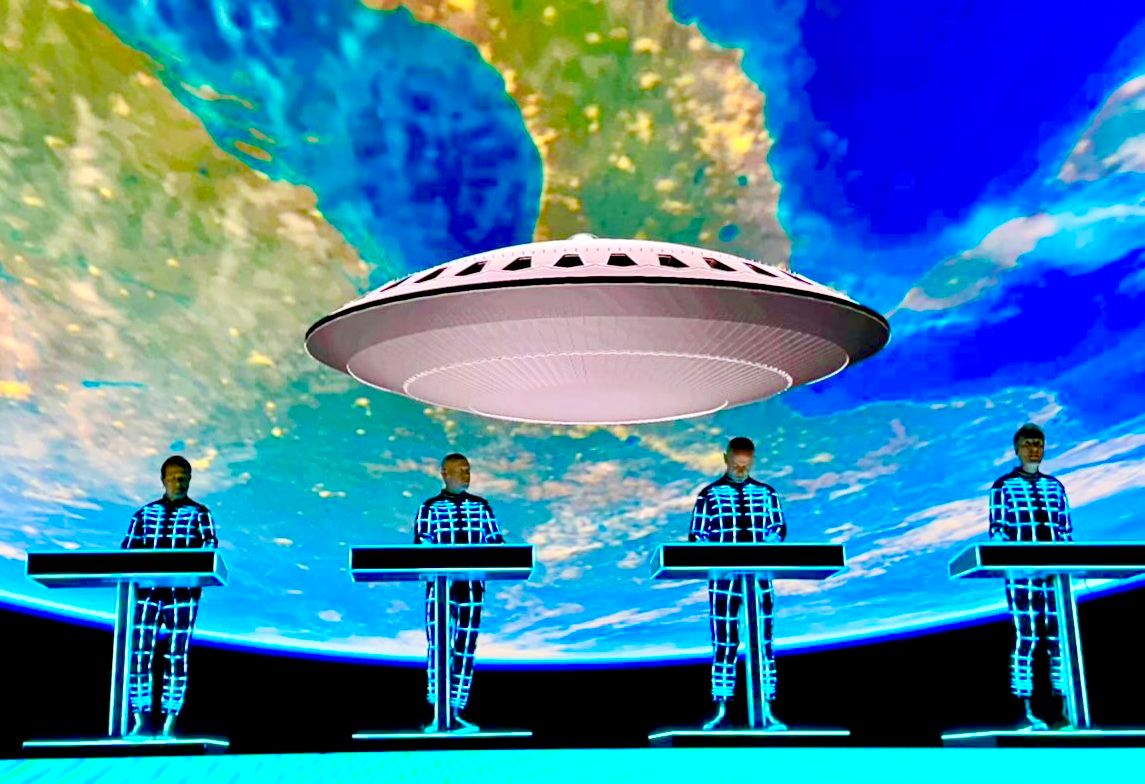
Kraftwerk

Audio By Carbonatix
In their 55 years as a band, Kraftwerk has managed the rare double-feat of changing the face of modern music forever, while never breaking into the mainstream. If you’ve listened to disco, hip-hop, house, techno, trance, or virtually anything else associated with electronic beats, you are enjoying the indirect influence of a prolific duo from Dusseldorf, Germany. And yet just as likely, you’re also asking, as the band prepares to play a rare show in Phoenix, Who the hell is Kraftwerk?
Ralf Hütter and Florian Schneider were the brilliant, classically trained core of the Kraftwerk quartet. Music producers and intellectual musicologists (i.e., music nerds) can rattle off a catalog of tracks that owe to their sound. Take Steven Greenberg, who produced “Funkytown” by Lipps Inc., or Giorgio Moroder, producer of Donna Summer’s disco masterwork “I Feel Love.” Both men were obsessed with Kraftwerk. Hits such as “Cars” by Gary Numan, “World in My Eyes” by Depeche Mode, New Order’s “Blue Monday” and Devo’s “Whip It” would absolutely not exist without Kraftwerk. Unsurprisingly Daft Punk and Trent Reznor are fans, but also a roster of unexpected rock legends: David Bowie, Roxy Music, Coldplay and even Neil Young have cited Kraftwerk as an inspiration.
Kraftwerk styles and samples have permeated hip-hop from the jump – in early Afrika Bambaataa beats most clearly. Run DMC told NME in 2020, “Kraftwerk created hip-hop. Kraftwerk were a foundation of hip-hop not just because of their music, but they built their own machines and computers. They were doing the same thing as young boys and girls in the Bronx were doing at the beginning of hip-hop. We didn’t have studios but we heard their music and there was something in their music that connected us. If you listen to the early years of hip-hop… we followed the blueprint of a group from Germany.”
Kraftwerk was so ahead of its time in part because the group latched onto electronic sounds before such instruments even existed. Hutter and Schneider fabricated experimental drum controllers and sequencers, and were among the first to embrace synthesizers, specifically the Moog analog keyboard that quickly became the world’s best-known synthesizer. Their use of distorted, robotic voices changed contemporary music as well. Who would have thought that voices similar to a Cylon or Colossus or even a Speak & Spell would become commonplace?
Schneider died in 2020, achingly just shy of Kraftwerk’s 2021 induction into the Rock & Roll Hall of Fame. Pharrell Williams – another legendary acolyte of Kraftwerk’s music – introduced the group in that ceremony. Kraftwerk was long overdue for the accolade but many in the audience had no idea that nearly everyone they listen to on the radio produces music with the aforementioned drum machines or controllers, sequencers (now computer-based) and synthesizers. Kraftwerk steered not only the sound but the very production of contemporary music.
This group that formed in 1970 rarely makes appearances in the Southwest; Kraftwerk’s April 14 show appears to be just the second in Phoenix across the group’s 55-year run. And it’s at the Orpheum Theatre – the perfect venue to virtually stand as an opening act in itself.
So what’s the vibe at Kraftwerk’s live shows? First of all, this isn’t Nine Inch Nails. Kraftwerk is a four-man presentation with illuminated podiums. Ralf Hutter and the three other musicians (technicians?) beside him do not move or jump around – at all. Each Kraftwerk member performs a completely synchronized show. Hütter handles vocals (often robotic) and keyboard melodies. The others handle beats, bass lines, video projections and additional synths. The video display features dazzling digital arrays of colors as well as vintage montages of cars, models, and neon lights. And Kraftwerk audiences in turn are calm, reserved, and politely applaud after each number. It’s all rather mature.
Kraftwerk presents variations of their classics that fans never grow tired of – “Numbers,” “Tour De France,” “The Man Machine,” “Autobahn,” and newer electro jams like “Expo 2000” all set to huge-screen 3D visuals. Yes, they give you cardstock Kraftwerk glasses to wear before the show.
The sound is impeccable, the projections are in perfect sync to finite details, and the lighting is illustrious. It can’t really be described. If you want a preview, go to YouTube and peep their tour videos. It’s OK if their glowing grid suits remind you of “Tron.” The whole experience is a throwback – and a living piece of music history.
Kraftwerk performs at the Orpheum Theatre on Monday, April 14 at 8:00 p.m. Tickets run from $60 to $130.